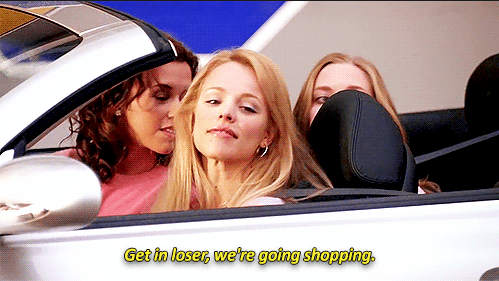
Me: I absolutely do not need more stuff, and I am absolutely committed to my new savings plan.
Me as soon as I see a %-off sign: I absolutely need this bargain thing in my life right now, it’s exactly what has been missing from my possessions.
Don’t even try to pretend you haven’t done the same thing. Whether it’s fashion, food, technology, books or whatever, somehow as soon as the price drops, we simply cannot resist the deal.
And it’s not just an age thing, because I know any Boomers that got lost on the internet and ended up here are at this moment opening their mouths to say ‘bloody millennials’.
I have very fond memories of turning up to my grandparents’ house as a kid to have my Da (aka Grandad) always presenting us with the latest ‘bargain’ he’d found. It was usually food or books. It’s hard to go wrong with a book, but there was that infamous time of the ‘bargain cheese’. It SMELT and not in that purposely-fermented kind of way. It was in that definitely-was-a-bargain-because-it-expired-a-week-ago kind of way. He bought SO much of it. He STILL ate it. I have forever admired his commitment to enjoying a discount.
Did he need rotting cheese in his life? I highly doubt it. Do I need that designer dress just because it’s at a price I can actually afford now? My heart screams yes but my brain says no.

But, dear fellow suckers, it’s not our fault.
FOMO And Our Competitive Natures
We’re scared of missing out. Sales signs purposefully put a ticking time bomb on their special deals so we’re well aware that if we don’t get in quick that thing we actually didn’t really want before will be gone, gone forever. No changing of mind allowed. It plays on our emotions.
“This is especially potent in online shopping when you can see merchandise selling out before your eyes and can’t see who else might be considering your prize,” explains consumer research psychologist Kit Yarrow, writing for Psychology Today.
FOMO is real, sure, but we’re also a competitive bunch. We can’t help thinking that if we don’t get the thing, someone else might. It often happens subconsciously. And that we cannot stand. It’s like when I start playing a board game I can chuckle and sip my wine because this is just casual fun with friends, then literally 0.25 seconds later I am ready to kill to take the lead.
Not a joke. Do not play board games with me.

Assumed Value
We don’t really have much of an eye for quality anymore. We have no idea why the price of one thing is different to another. Most of us have come across some VERY convincing fake designer digs on that Bali/Thailand trip. Sure we knew it was a knock-off because of the context but if we’d grabbed that in a shopping center we’d have no clue.
How do we judge? By the price.
Sure we were only going to spend $10 on a basic white tee to go with everything, but now look! There’s a $300 designer label white tee on sale for $150 and therefore the quality MUST be better and worth the extra money. The truth is, most of you have no clue, and a lot of names you recognise are making their products in the exact same factories as the names you don’t.

Savings Focus
Sales advertising knows our weaknesses and appeals to them, it’s simple psychology. Huge colourful sales signs blast sales in our faces and panic us with deadlines. The advertising switches its focus to how much we’re saving, so by turn, we start thinking about the money we could have spent, rather than the extra money we actually did spend because we didn’t need the thing in the first place.
How do we avoid this? Yarrow says it’s all about the money.
“The quickest fix is to pay with cash. Credit cards are a buffer and put the emphasis on what you’re getting rather than what you’re giving when you shop. Gift cards are even worse, they can seem like “free money” rather than real dollars.”
Bottom line, as humans we are weak, and marketing is evil. Fight the machine. The end.



